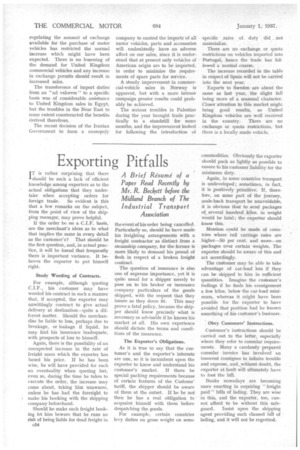Exporting Pitfalls
Page 104

If you've noticed an error in this article please click here to report it so we can fix it.
A Brief Résumé of a Paper Read Recently by Mr. R. Beckett before the Midland Branch of The Industrial Transport Association
I T is rather surprising that there should be such a lack of efficient knowledge among exporters as to the actual obligations that they undertake when accepting orders for foreign trade. So evident is this that a few remarks on the subject, from the point of view of the shipping manager, may prove helpful.
If the order be on a C.I.F. basis, are the merchant's ideas as to what that implies the same in every detail as the customer's? That should be the first question, and, in actual practice, it will be found that frequently there is important variance. It behoves the exporter to put himself right.
Study Wording of Contracts.
For example, although quoting C.I.F., his customer may have worded his contract in such a manner that, if accepted, the exporter may unwittingly contract to give actual delivery at destination—quite a different matter. Should the merchandise be liable to loss, perhaps due to breakage, or leakage if liquid, he may find his insurance inadequate, with prospects of loss to himself.
Again, there is the possibility of an unexpected increase in the rate of freight upon which the exporter has based his price. If he has been wise, he will have provided for such an eventuality when quoting but, even so, during the time he takes to execute the order, the increase may come about, taking him unawares, unless he has had the foresight to make his booking with the shipping company beforehand.
Should he make such freight booking let him beware that he runs no risk of being liable for dead freight in the event of his order being cancelled. Particularly so, should he have made his freighting arrangements with a freight contractor as distinct from a steamship company, for the former is more likely to demand his pound of flesh in respect of a broken freight contract.
The question of insurance is also one of supreme importance, yet it is quite usual for a shipper merely to pass on to his broker or insurance company particulars of the goods shipped, with the request that they Insure as they deem fit. This may prove a fatal policy, because the shipper should know precisely what is necessary or advisable if he knows his market at all. His own experience should dictate the terms and conditions of the insurance.
The Exporter's Obligations.
As it is true to say that the customer's and the exporter's interests are one, so it is incumbent upon the exporter to know and understand his customer's market. If there be special packing requirements because of certain features of the Customs' tariff, the shipper should be aware of them at the outset. If he be not then he has a real obligation to acquaint himself with them before despatching the goods.
For example, certain countries levy duties on gross weight on some commodities. Obviously the exporter should pack as lightly as possible to ensure to his customer liability for the minimum duty.
Again, in some countries transport is undeveloped ; sometimes, in fact, it is positively primitive. If, therefore, on some part of the journey, mule-back transport be unavoidable, it is obvious that to send packages of several hundred kilos. in weight would be fatal ; the exporter should know this.
Mention could be made of countries where rail carriage rates are higher-50 per cent. and more—on packages over certain weights. The exporter should be aware of this and act accordingly.
The customer may be able to take advantage of car-load lots if they can be shipped to him in sufficient quantities. Imagine the customer's feelings if he finds his consignment a few kilos. below the car-load minimum, whereas it might have been possible for the exporter to have avoided that position had he known something of his customer's business.
Obey Customers' Instructions.
Customer's instructions should be carried out to the letter, especially where they refer to consular requirements. Many a carelessly prepared consular invoice has involved an innocent consignee in infinite trouble and expense, and, without doubt, the exporter at fault will ultimately have to foot the bill.
Banks nowadays are becoming more exacting in requiring "freight paid" bills of lading. They are wise in this, and the exporter, too, cannot afford to be without this safeguard. Insist upon the shipping agent providing such claused bill of lading, and it will not be regretted.




























































































































































